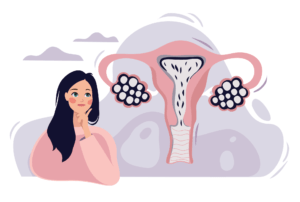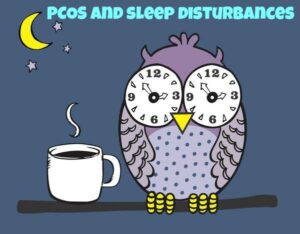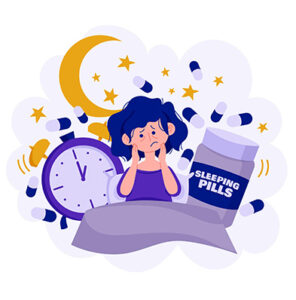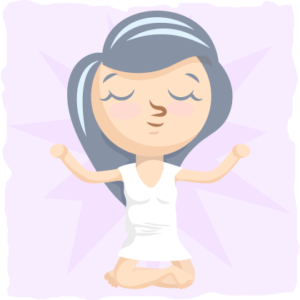If you have PCOS, you’re likely all too familiar with the havoc it can wreak on your body. But did you know that PCOS can also impact your sleep? PCOS leads to many types of sleep issues. In this blog post, we’ll explore the connection between PCOS and sleep issues, and offer some tips for getting the good night’s sleep you need.
Contents
What is PCOS?
 Polycystic ovary syndrome (PCOS) is a complex endocrine disorder that affects women’s, both metabolic and mental health. It is one of the most common hormonal disorders among women of reproductive age.
Polycystic ovary syndrome (PCOS) is a complex endocrine disorder that affects women’s, both metabolic and mental health. It is one of the most common hormonal disorders among women of reproductive age.
PCOS is a hormonal disorder that causes missed or irregular periods, it can also make it difficult for a female to get pregnant. Therefore, it is a leading cause of fertility problems. It can also cause excess hair growth, acne, and weight gain. It affects women of all ages, but most commonly develops during puberty. PCOS is caused by a combination of genetic and environmental factors.
Importance Of Sleep To Handle PCOS
 At one time or another, we all faced the consequences of sleep deprivation. It’s not a fun experience at all!
At one time or another, we all faced the consequences of sleep deprivation. It’s not a fun experience at all!
Not getting enough sleep can make you more tired and irritable. You may have a normal feeling of dizziness and the only thing you can think of is to go back to sleep. Therefore, Good sleep is essential for overall health and well-being, but it is extremely important for women with PCOS.
Sleep plays an important role in helping women manage the symptoms of PCOS. Experts believe that women with PCOS may not be able to sleep well because of their metabolic changes, especially glucose (sugar) metabolism. Women with PCOS are also more likely to develop hormonal disorders that interfere with their sleep. Therefore, having a good sleep is important for women with PCOS and it’s essential to have some guidelines to make sure they sleep well.
PCOS And Sleep Issues Are Inter Related
 Researches reveal a strong relation between PCOS and sleep issues. PCOS can cause sleep problems, and sleep problems can make PCOS symptoms worse. There are several possible explanations for the connection between PCOS and sleep. They are mentioned below:
Researches reveal a strong relation between PCOS and sleep issues. PCOS can cause sleep problems, and sleep problems can make PCOS symptoms worse. There are several possible explanations for the connection between PCOS and sleep. They are mentioned below:
- PCOS causes sleep problems because of the hormone imbalances that are a hallmark of the condition.
- PCOS causes anxiety and depression, both of which can interfere with sleep. Sleep deprivation makes PCOS symptoms worse by causing weight gain, insulin resistance, and inflammation.
- Sleep disorders are common in patients with PCOS. These disorders include daytime drowsiness, difficulty sleeping, and sleep disturbances which reduce sleep quality in these patients.
- Patients with PCOS have a higher risk of sleep issues compared to healthy people. PCOS should include concerns about sleep quality and the right way to reduce these problems and improve the quality of life.
Common Symptoms
Common symptoms include:
- daytime fatigue,
- difficulty sleeping, or
- restlessness
Sleep Issues Associated With PCOS
As mentioned earlier, people with PCOS are more likely to develop sleep issues. Sleep disorders can persist for a long time and can make symptoms worse.

Insomnia means the inability to get enough sleep. People with this sleep issue may have difficulty falling asleep or falling asleep which can lead to anger, low energy, and mood swings.
As a result of insulin resistance, the body constantly tries to regulate blood glucose levels, which interferes with the body’s metabolism. Problems with glucose intake can make you feel tired, but it can also lead to sleep problems, PCOS, and sleep deprivation. While insulin resistance can be a major cause of depression, sleep deprivation can lead to more serious problems. For example, elevated cortisol levels can lead to long-term sleep deprivation, which over time is associated with increased inflammation and improved PCOS symptoms.
Obstructive Sleep Apnea
Obstructive sleep apnea (OSA) is defined as a cessation of breathing during sleep. Symptoms of sleep apnea include excessive daytime sleepiness, headache, and irritability.
People with PCOS are 30 times more likely to have OSA. In addition, OSA can increase the symptoms of PCOS, such as fatigue, difficulty losing weight, high blood pressure, and insulin resistance. Sleeping with a continuous cardiopulmonary resuscitation machine (CPAP) can help you adjust your breathing. A CPAP machine can also help with PCOS-related medical tasks, such as insulin resistance, high blood pressure, and high cholesterol. In addition to a CPAP device, an oral device that pulls the jaw in front of a therapist is also suitable.
Why Does PCOS Cause Sleep Issues?
 There are a few reasons why people with PCOS are suffering from sleep issues. Major of them are:
There are a few reasons why people with PCOS are suffering from sleep issues. Major of them are:
- Women with PCOS have a higher risk of respiratory distress (OSA), a condition in which air is often blocked during sleep.
- PCOS can cause insulin resistance, which is when your body doesn’t use insulin as well as it should. This can lead to type II diabetes and prediabetes, both of which have been linked to sleep problems.
- PCOS can also cause an imbalance of the hormones that control your menstrual cycle. This can lead to irregular periods, which can in turn lead to sleep problems.
- PCOS can also cause anxiety and depression, both of which have been linked to sleep problems.
- PCOS can also lead to weight gain, and women are often overweight or obese. Being overweight is associated with sleep disorders, such as insomnia, and OSA in the general population.
- Hormonal imbalance in women with PCOS can reduce the production of the hormone progesterone. Progesterone has been shown to have a significant effect on sleep stabilization
Tips For Women With PCOS To Support Good Sleep
Restful sleep is important for your well-being, especially with PCOS. Good sleep can help support mental health, protection, high blood sugar health and make it easier to maintain a healthy, balanced diet. Improving sleep can help women with PCOS manage their symptoms, exploring ways to get better sleep. Some tips to cope with PCOS and sleep issues are:
 Improve Sleep Hygiene
Improve Sleep Hygiene
Sleep hygiene is referred to as a set of behavioral and environmental models designed to promote healthy sleep and developed to treat sleep problems. In sleep hygiene education, patients get better sleep and are refreshed by using a set of tips to regain sleep. If you are waking up feeling sick, the best place to start is to practice good sleep hygiene – see the tips below:
Limit Screen Time
If possible, try to avoid time with digital devices at least 30 to 60 minutes before bedtime. The less time you spend with your cell phone, laptop, and TV, the better sleep you will get.
Avoid Daytime Sleepiness
Day Napping tends to interfere with sleep, and sleep hygiene tips often include advice to avoid sleeping longer than 30 minutes a day.
Imagine The Morning Sunlight
If there is exposure to the sun in the morning within a minute after you wake up, you can adjust your mood. Score bonuses if you can get out in dozens of categories today!
Be Careful With Caffeine Intake
Caffeine consumption near bedtime can disrupt sleep. Several studies show that caffeine consumption about 30 minutes before bedtime leads to sleep disturbances, increased sleep intensity (SOL), decreased total sleep time (TST), and bad sleep quality. Even if you do not feel anxious about your cup of coffee at noon, it interferes with your sleep. Try to stick to caffeinated beverages only in the morning.
Improve Your Sleeping Environment
Make your sleeping environment quiet, cool, and dark. Sleep in a comfortable bedroom and adjust the temperature, take a hot bath 2 hours before bedtime. Many people also find that emptying their bedrooms can help as it removes distractions. You can place non-sleeping or stimulated elements outside the bedroom i.e. eating, electronic devices, or work-related objects.
Stay Consistent
Establishing a sleep routine such as waking up and going to bed at the same time each day can help your body to have a bedtime.
Practice Breathing Exercises
If something distracts your mind at night regularly, try breathing or meditation to change your focus.
Eat healthy Food Before Bed
Did you know that certain foods can affect your sleep? Studies show that certain foods and dietary combinations can interfere with your daytime alertness and sleep quality.
- Protein Enhanced Nutrients: Try to have a low-protein meal or drink near bedtime to help maintain a healthy diet throughout the night. Some of the best foods rich in protein include nuts like almonds and walnuts, sliced pears, and cheese. It can help you relax your nerves and relax your mind.
- Herbal teas: With sleep disorders, you can take advantage of your chamomile tea. Chamomile tea is often recommended for those suffering from anxiety, worry, and difficulty sleeping. Chamomile contains apigenin, an antioxidant that promotes relaxation and sleep. In addition to chamomile tea, other remedies, such as lavender tea, have been shown to have beneficial effects on people with insomnia. Just make sure you stay away from caffeine!
Essential Oils
Essential oils are found naturally in plants. They are famous for their soothing and healing properties. Consider adding essential oils to your nighttime routine if you have difficulty falling asleep or falling asleep. Lavender, chamomile, eucalyptus, and jasmine are some of the essential oils that can help with sleep. You can apply it directly to the skin.
Seek Aid From A Health Professional.
If you are suffering from PCOS with sleep issues, make an appointment with your healthcare provider. Make a list of your symptoms and the number of hours you sleep. Your doctor will help identify your difficulty. He may check your sleep, eye movement, breathing effort, muscle movement, heart rate, and blood oxygen level.
At times, doctors can offer you suitable therapies also. Some of the useful therapies are mentioned below:
- Cognitive-behavioral therapy: This therapy can help you change your thinking and behaviors that are affecting your sleep.
- Stimulus control therapy: This therapy helps you to associate your bed and bedroom with sleep. It also limits activities in bed so that you only use it for sleep.
- Relaxation training: This method helps you to relax your body and mind through different techniques like deep breathing or progressive muscle relaxation.
- Biofeedback: This method uses sensors to help you see how well you are relaxing your body. It can help relieve stress and anxiety that may be affecting your sleep.
- Medications: Your doctor may prescribe medication if other methods do not help you get enough sleep. Medications can have side effects, so it is important to discuss this option with your healthcare provider.
A few examples of some prescriptions are:
- Benzodiazepines are a class of drugs that can help you feel calm and relaxed and thus helps reduce your sleep issues.
- Tricyclic antidepressants, such as amitriptyline and doxepin, are sometimes prescribed for sleep problems or insomnia.
PCOS and sleep issues can be tricky but with the help of a health professional, you can get your sleep back on track! If you are experiencing any PCOS symptoms, please make an appointment with your healthcare provider. Make sure you follow all your doctor’s advice.
Conclusion
At last, we can state that there exists a strong connection between PCOS and Sleep Issues, and if you’re struggling with one, it’s worth looking into the other. PCOS can cause sleep issues, and sleep issues can make PCOS symptoms worse. If you’re not getting enough sleep, try to seek a suitable remedy as soon as possible to improve your sleep ailment. In the meantime, try some of the tips above to see if you can get a better night’s sleep. PCOS is a complex condition, and there’s no one-size-fits-all solution. But getting enough sleep is an important part of managing PCOS and improving your overall health.
For more information, please contact MantraCare. Sleep is an essential part of our daily routine and it plays a significant role in maintaining a healthy body and mind. If you have any queries regarding Online Insomnia Counseling experienced therapists at MantraCare can help: Book a trial therapy session

 Improve Sleep Hygiene
Improve Sleep Hygiene
